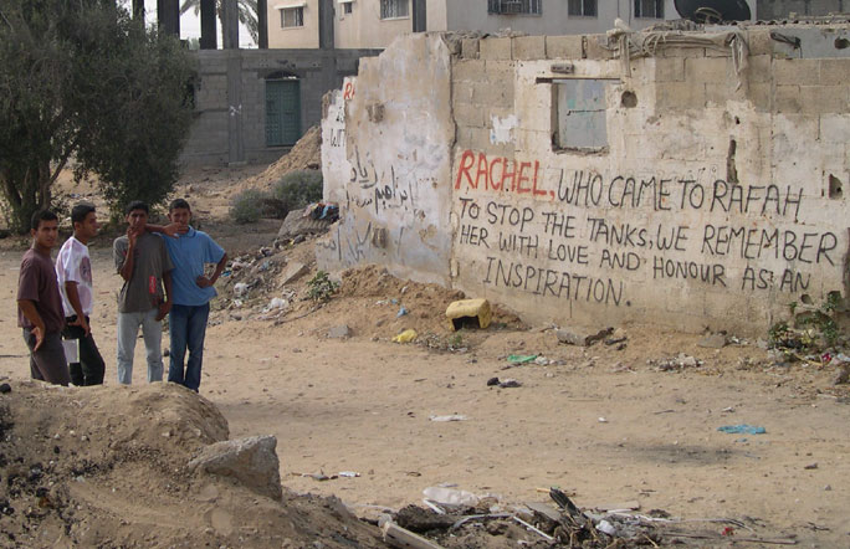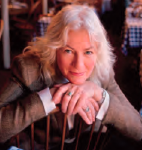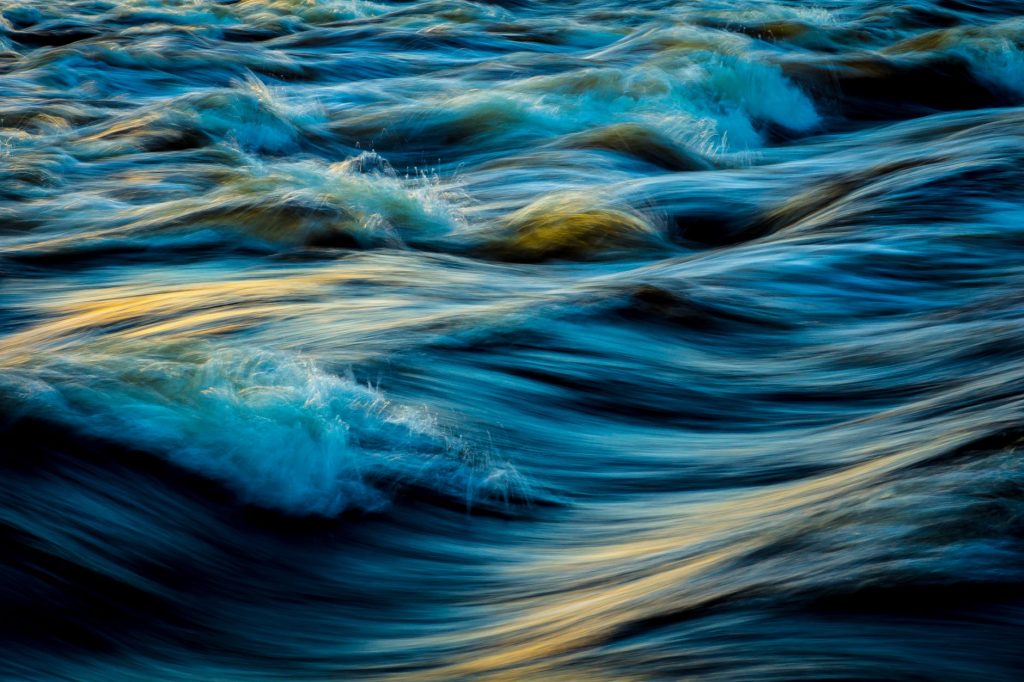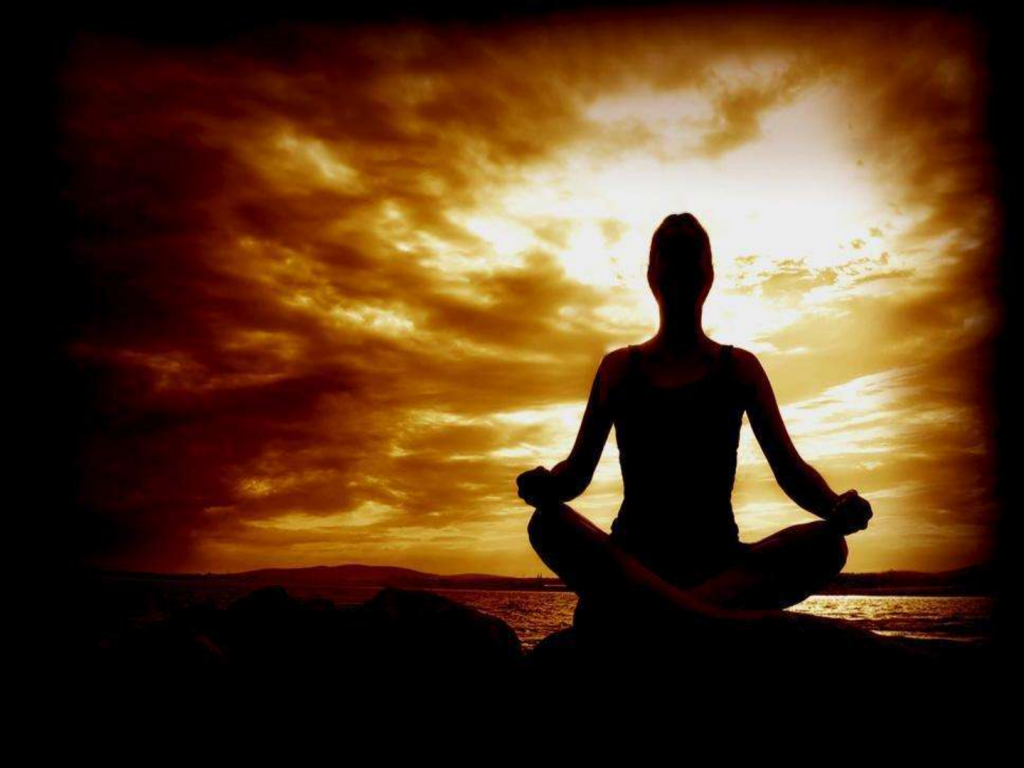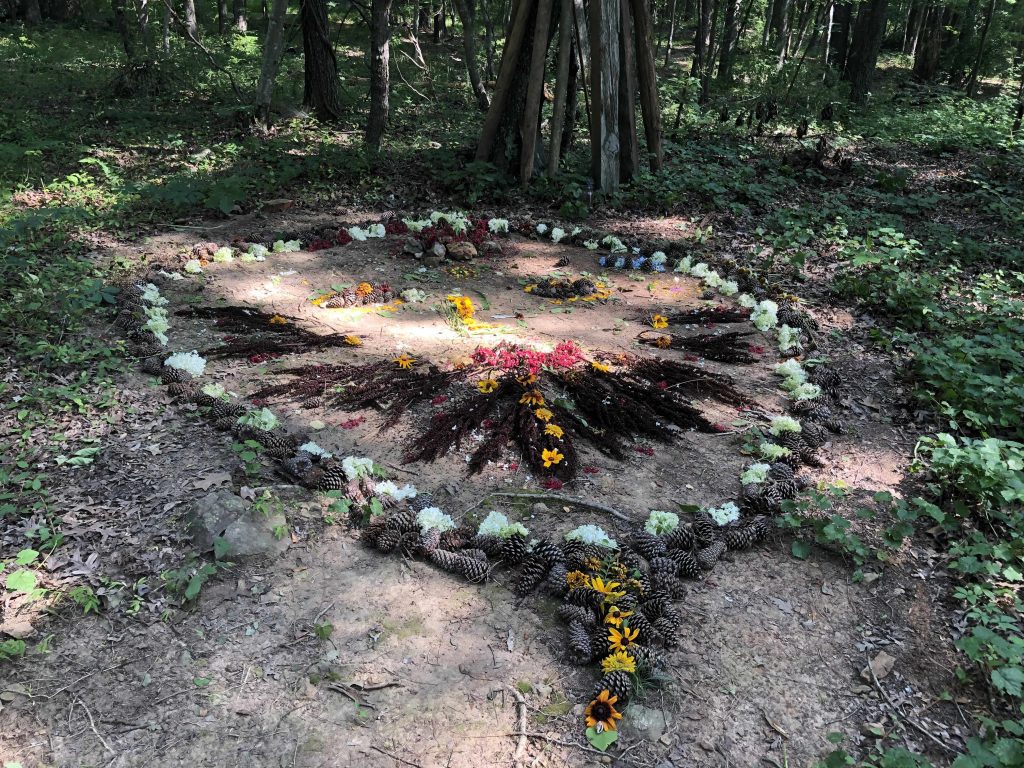Gaza on My Mind
Talking about Gaza can be scary. I have expressed my horror about the savage Hamas attack on Israelis, and the heartbreaking plight of the hostages, but when I criticize Israeli policies and the bombing of Gaza, some of my Jewish friends have called me antisemitic. This is hurtful. To say this is a controversial subject is an understatement. I am not a scholar or historian. I am not Muslim or Jewish. So why do I feel compelled to discuss this?
Though I do not identify with any organized religion, I do identify as an American. Not the nationalistic “my country right or wrong” American, but rather a Langston Hughes style American who sees our country as “the land that never has been yet — and yet must be — a land where every man is free.” I am ashamed of American’s sordid history – the genocide of Native Americans, the slavery of Africans, the unjust treatment of African Americans since emancipation, and other ongoing violations of our principles. l am an American who, like the poet Hughes, has sworn that someday America will be the country where our ideals of liberty and justice for all people will be achieved. It is vital to me that US foreign policy confirms and reflects these ideals. As I once opposed the bombing of the Vietnamese and then the Iraqis, I now oppose the US financed bombing of Gaza and uphold the right of Palestinians to self-determination.
This article explains how I came to oppose US military support of Israel’s war on Gaza, as well as its occupation of the Palestinian territories. My story begins twenty years ago, in September 2003, when I traveled to Gaza to honor the life and death of a twenty-three-year-old American peace activist named Rachel Corrie. She was a volunteer human rights observer with the International Solidarity Movement, a pro-Palestinian group founded by Israeli and Palestinian activists, who were committed to resisting the Israeli occupation by using Gandhian nonviolent practices and protest. When I learned that Rachel had been crushed to death on March 16, 2003, by an Israeli-owned bulldozer as she stood before the home of a Palestinian physician and his family to defend it from demolition, I felt compelled to go there and to understand why.
I called my activist friend Medea Benjamin, co-founder of Global Exchange and Code Pink, to ask if she would come with me to Gaza. Though she had been avoiding involvement in the conflict in deference to her Jewish parents, Medea was now ready to go. I recruited a delegation of seven women, including two Jewish and one Muslim, and Global Exchange organized our itinerary to meet with Israeli and Palestinian human rights groups in Israel, Gaza, and the West Bank.
The purpose of our 2003 trip was to gain insight into the conflict between Israel and the occupied Palestinian territories. My mission was also to establish relationships with a Jewish-owned restaurant in Israel and an Arab-owned restaurant in the occupied Palestinian territories as part of the White Dog Cafe’s International Sister Restaurant program, “Table for Five Billion.” Beginning in 1987 the program had brought delegations of our customers and staff to Nicaragua, Cuba, Vietnam, and the Soviet Union to experience the impact of US foreign policy and work toward a world where everyone (five billion then, and even more now) has a place at the table.
When we arrived in Gaza in September of 2003, our group of travelers sat sipping coffee in a busy outdoor café, much like any European café, in Gaza City. When we heard the hum of an airplane in the distance, I saw alarm on the faces of our Palestinian hosts. On the way to the café, we had seen the burned- out carcass of a car blocking a narrow street in a busy marketplace and been told that it had been hit by an Israeli Defense Force (IDF) missile, killing many innocent bystanders. Even in this peaceful café setting, I saw how people lived in fear in Gaza — called by many “an open-air prison,” from which there was little escape.
Twenty years later, fear has consumed all of Gaza night and day as Israeli fighters unleash the most destructive bombing campaign in modern history, already having used more than twice the firepower of the nuclear bomb dropped on Hiroshima. As many as 27,000 Palestinians have been killed, including more than 12,000 children and 66,000 wounded. No hospitals are fully functional. There is no anesthesia for surgeries. No antibiotics to stave of deadly infections. Families and orphans of those killed are sleeping in tents and on the street. One toilet is available for every 500 people, according to the World Health Organization. Since October 7, over 400 doctors and medical staff have been killed. The UN has lost 142 personnel, the largest number lost in any conflict in history. More than one hundred and twenty journalists have been killed, and the International Federation of Journalists in NYC has accused the IDF of ‘deliberately targeting’ media professionals working in Gaza
One of the most moving experiences for me on our 2003 trip was meeting Rami Elhannan, an Israeli whose 14-year-old daughter had been killed by a Hamas suicide bomber on her way home from school in 1997. After a year of struggling with anger and despair, Rami joined Bereaved Families Supporting Reconciliation and Peace, a group of Israeli and Palestinian families who had each lost loved ones to the conflict. He told us that his life had taken on new meaning as he worked in partnership with Palestinians to stop violence and end the occupation.
Now twenty years later, Hamas has only gained in strength. Their murderous attack on October 7, killing 1200 Israelis and taking 250 hostages is the tragic result of what they have become. What gives me hope is that Rami, even after this outrage, continues his work to end the violence and co-exist peacefully with Palestinians. The reconciliation and peace organization, now called Parents Circle, is co-directed by Rami and his Palestinian counterpart, Bassam Aramin, whose 10-year-old daughter was killed in 2007 by an IDF soldier using a US issued M-16 rifle, as she stood outside of her school.
In a 2023 interview, Rami explained that twenty-five years ago, he had never seen a Palestinian as a human being. But through the Parents Circle he had learned the music, the culture, and the stories of the Palestinians, which he explained had been deliberately hidden from him by the Israeli education system. When asked how to end the conflict, Rami said that the most important word is “respect” and to see Palestinians as equal partners in building a peaceful future.
In 2003, when we arrived in Rafah, a Palestinian city in the southernmost part of Gaza, near the Israeli-controlled border with Egypt, we visited the home of a Palestinian school headmaster Khalil Bashir. We were horrified to find that Israeli soldiers had not only destroyed his groves of date and olive trees and two acres of greenhouses, but the soldiers had also taken over the upper floors of his three-story home as an army base to protect the newly erected homes of Israeli settlers nearby. Despite this unimaginable disrespect, Khalil continued to teach non-violence and peaceful coexistence to his children and students.
In a letter to her mother in February 2003, Rachel Corrie wrote about the people of Gaza:
“I am amazed at their strength in being able to defend such a large degree of their humanity – laughter, generosity, family-time – against the incredible horror occurring in their lives and against the constant presence of death. I am also discovering a degree of strength and of basic ability for humans to remain human in the direst of circumstances. I think the word is dignity.”
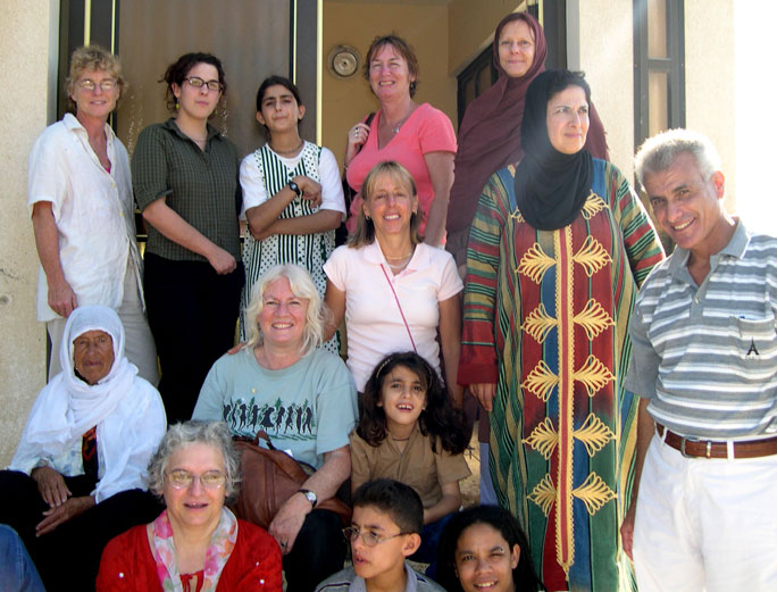
We later learned that in 2004 Khalil’s 15-year-old son, Yousef Bashir, had been shot in the back by an IDF soldier. Because three UN officials witnessed this, he was sent to an Israeli hospital where he slowly recovered. Since then, Yousef moved to the US and wrote a book about his father’s dedication to non-violence. In a 2019 New York Times op-ed, he said this about the soldier who shot him: “I wish we could talk. I would tell him that I want to do my part to make peace between our peoples more possible, the way my father taught me. I would tell him that I have forgiven him.”In Rafah, our delegation next went to the place where Rachael Corrie was killed. We stood solemnly before the pile of rubble that marked where she had been crushed under an armored bulldozer driven by an IDF soldier. Prior to her death, over six hundred houses had been destroyed in Rafah, along with Palestinian businesses, including 25 greenhouses, the source of income for three hundred people. In her last email to her father written less than two weeks before her death, 23-year-old Rachel wrote:
“Coming here is one of the better things I’ve ever done. So when I sound crazy, or if the Israeli military should break with their racist tendency not to injure white people, please pin the reason squarely on the fact that I am in the midst of a genocide which I am also indirectly supporting, and for which my government is largely responsible.”
I understand that some readers who identify with Israel may not agree with Rachel’s analysis of the situation, but it’s important to know how she saw it and to admire her willingness to stand up to the powerful forces she viewed as oppressors, as we hope someone would do for us and our families if we were in such danger. Twenty years later, in 2023, I still picture the pile of rubble marking the spot where Rachel tragically lost her life amid the destruction of Palestinian homes and businesses. I am deeply saddened to know that today the rubble has grown to encompass much of Gaza, with over 70% of housing demolished by Israeli bombs, displacing 90% of the population. Untold thousands of Palestinian civilians in Gaza, over a third children and infants, have been crushed to death in their own homes.
In 2003, we saw so many Palestinian children, often dressed in neat school uniforms, their eyes bright and faces curious to meet strangers. They pointed out the bullet holes in their houses and showed us shell casings they had collected during the IDF incursions, and they pointed to the place where Tom Hurtnell, a young English volunteer, was shot in the head as he ran to grab a child who was caught in gunfire. In Hebron, a Palestinian town in the West Bank where four hundred Jewish settlers from Russia had illegally taken residence, we met with Chris Brown from Christian Peacekeepers Team. He explained how his group escorted children to school through army barricades, where the IDF soldiers point guns at them, and past hostile settlers who hurl abuse, and sometimes spit on and physically attack the children. By 2003, over six hundred Palestinian children had died in the conflict at the hands of the IDF or the settlers. We visited a school where the children sang to welcome us, and as we looked at their promising young faces, it was hard not to despair over the sheer hopelessness of their future.
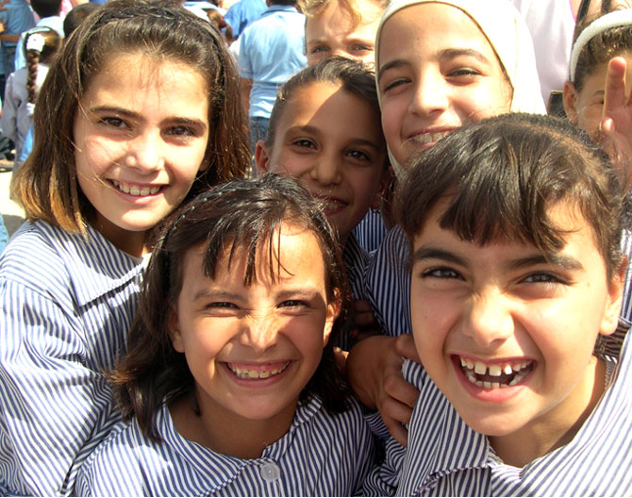
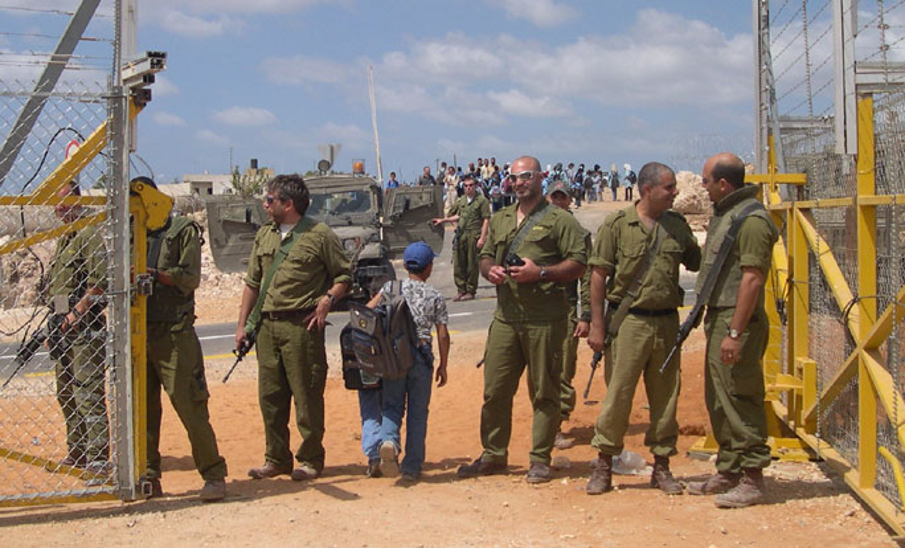 Palestinian school children passing through an IDF checkpoint on their way to school, Hebron, West Bank, 2003.
Palestinian school children passing through an IDF checkpoint on their way to school, Hebron, West Bank, 2003. I never imagined that twenty years later, against international law, there would be over 700,000 settlers in the West Bank and East Jerusalem occupying 40% of Palestinian land against international law. Just since October, 739 Palestinians in the West Bank, including 309 children, have been displaced, following the destruction of 115 homes. The IDF has armed settlers in the West Bank, giving them impunity to violently force Palestinians from their homes, increasing acts of violence from an average of three a day to seven. Recently, a Palestinian-American teenager visiting his cousins was shot in the head. He is one of 369 killed in the West Bank since October, including ninety-five children.As our 2003 delegation traveled through the West Bank, we saw how the yards of the settlers’ homes were lush and green with well-watered grass, in sharp contrast to the arid, brown, and lifeless Palestinian areas. At a large Jewish settlement near Jerusalem, we even saw people enjoying an Olympic size swimming pool, while the Palestinians were forced to survive on 20% of the available water, even though their population is far greater, and did not have enough water to grow their crops to feed their people.
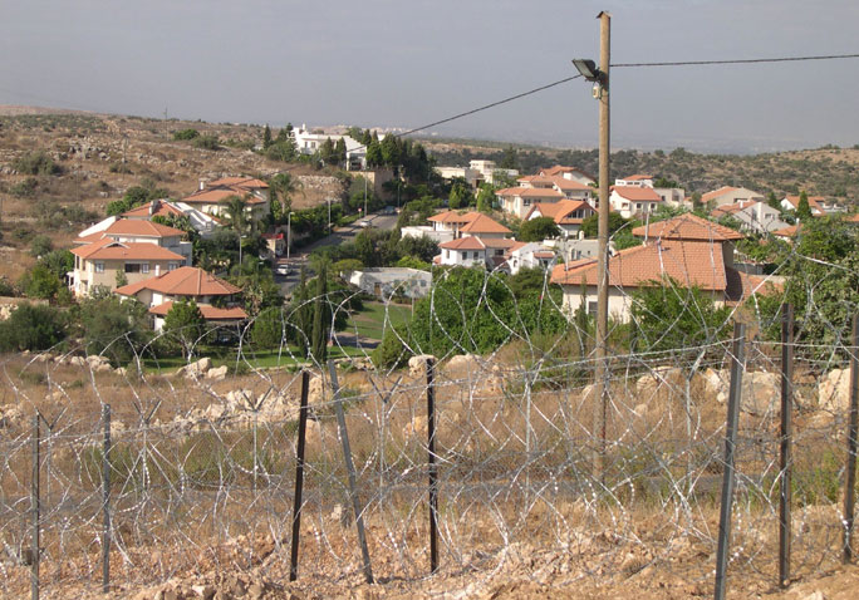
Though this seemed so unfair back in 2003, it would have been unimaginable to think that, in response to the Hamas attack on October 7, the Israelis would cut off ALL water supply to the entire population of Gaza, as well as all food, fuel and medical supplies, leaving Palestinians to die of starvation, dehydration, and disease. Over 70% of the population is drinking contaminated or salty water, according to the UN. Recently, the World Food Program reported, “In Gaza at this moment, literally the whole population is in crisis level of hunger or worse. And of those people, about 26%, meaning one-quarter of the population is literally starving – about 577,000 people.” According to the UN, famine is now “inevitable” following the news that the US and some other Western countries have suspended funding to the UN Relief and Works Agency for Palestinian Refugees (UNRWA) because Israel has accused 12 of its 13,000 employees to have been involved in the October 7 attack. Though nine of the accused have been fired, one has died, and two are under investigation, funding needed to combat the famine that endangers millions of Palestinians has been denied.While our delegation was in Tel Aviv, we told a group of Israeli youth that we were staying with a Palestinian family. Their eyes widened with fear and surprise, as they warned us that we would be raped and murdered because Palestinians were dangerous terrorists. Though I heard Israelis claim that Palestinian youth are taught to hate Jews, this experience made me wonder if Israeli youth had been taught that all Palestinians are terrorists.
When I watched the 2023 film Israelism, produced by courageous young Jewish filmmakers, I finally understood the racist remarks of the Israeli youth we had met 20 years before. According to the documentary, Israeli students, as well as visiting American students, are subject to racist and militaristic indoctrination that teaches them to fear, loathe, and dehumanize Palestinians. On both sides, it is hatred of “the other” that underlies and inflames the conflict.
The Israeli policy of demolishing homes had led to Rachel’s death, and so in 2003 we met with Angela Godfrey-Goldstein from the Israeli Committee Against Home Demolition, where we learned how the IDF was, in violation of international law, demolishing Palestinian homes, their means of income and their cultural institutions, and replacing them with Jewish settlements. One of the most surprising and horrifying parts of our 2023 trip was seeing the frequent IDF checkpoints on roadways where Palestinians were stopped, searched, delayed, and humiliated while waiting for hours in the hot sun or rain. As a result, travel that should take minutes takes hours and even days, separating people from their jobs, schools, friends, and family. An Israeli peace group, Bat Shalom, told us that over sixty Palestinian newborns, unable to get to the hospital, had died at checkpoints. In contrast, modern highways connecting Jewish settlements were “Jews Only,” which reminded me of the “Whites Only” drinking fountains I had been shocked to see as a young girl visiting the US South.
Lately, I have been hearing the term “settler colonialism” in relation to the war in Gaza. I was not exactly sure what it meant, so I checked back in with the Israeli Committee Against Home Demolition and read an October 2023 article by its founder, American Israeli Jeff Halper. In reading this article, I came to understand why Rachel and many thousands of Palestinians have been tragically killed. As I write, the rightwing leadership in Israel is publicly advocating for the permanent displacement of Palestinians and the building of Jewish settlements in Gaza. For me, Halper’s description of “settler colonialism” rings true to what I have witnessed in Palestine, and to what happened in the founding of the US. I want to believe that, lost in our own shameful colonial past, there may have been non-violent settlers in the US who sought peaceful coexistence with the Native Americans, and stood up courageously as Rachel did. Halper wrote:
“Settler colonialism is a deliberate, structured, and prolonged process in which one people not only takes over the country of another – violently by necessity – but seeks to transform it from what it was at the time of invasion into an entirely new entity, a new country reflecting the settlers’ presence, entirely erasing the natives’ presence and history. It is not a “conflict”. There are no “sides”, no symmetry of “violence”. The settler project is a unilateral one which must deny the indigenous population’s existence as a people endowed with rights to their land and identities if it is to claim the country exclusively for itself. Following from that is the need to move the indigenous off their land, killing them, driving them out of the country or confining them to tiny enclaves, so as to settle the land with the settler population itself. Then comes the process of erasure: erasing the physical and cultural presence of the indigenous from the landscape and replacing it with the settlers’ own manufactured history, heritage, national narrative and national identity. After a prolonged process of violent displacement and the pacification of those amongst the indigenous who remain, the settler project concludes quietly. Now the world is presented with a normal, peace-loving, democratic country remade in the settler’s image, and the settler colony fosters a popular perception that it is the “real” country. (Try buying a plane ticket to Palestine.) The process of normalization is complete; any further resistance on the part of the native population is criminalized as “terrorism” and, as such, is effectively de-politicized and delegitimized.”
On February 15, 2003, a month before Rachel Corrie’s death, 25 million people in over 100 countries around the world took to the streets saying NO to George Bush’s war in Iraq. It was the largest peace demonstration in world history. On February 28, Rachel wrote:
“I look forward to more moments like February 15 when civil society wakes up en masse and issues massive and resonant evidence of its conscience, it’s unwillingness to be repressed, and it’s compassion for the suffering of others.”
Twenty years later, as Rachel Corrie hoped, global consciousness is growing. Millions of people around the world are holding massive demonstrations — in London, Tokyo, New York, Rome, Athens, Sydney, Jakarta, Istanbul, Bangkok, Sao Paulo, Bucharest, Paris, Berlin, and Johannesburg — calling for a ceasefire and the liberation of the long oppressed Palestinian people. Many of these protests are organized by Jewish organizations who stand squarely for peace and human rights for all. Israelis, in partnership with Palestinians, have formed groups such as A Land for All and Standing Together and are working on plans for a future of peaceful coexistence in two neighboring states. The current crisis makes them even more determined to achieve their vision.
Having gained the world’s attention, could the tragedy of Gaza possibly provide the opportunity for a turning point in human civilization when the people of the world give birth to a new world order built on the idea that we are all one, with no them and us, and that war is obsolete? On February 28, just a couple weeks before her death, Rachel wrote to her mother:
“I think I could see a Palestinian state or a democratic Israeli-Palestinian state within my lifetime. I think freedom for Palestine could be an incredible source of hope to people struggling all over the world. I think it could also be an incredible inspiration to Arab people in the Middle East, who are struggling under undemocratic regimes, which the US supports. I look forward to increasing numbers of middle-class privileged people like you and me becoming aware of these structures that support our privilege and beginning to support the work of those who aren’t privileged to dismantle those structures.”
In 1995, White Dog Café began holding a Freedom Seder, a celebration of the exodus of the Jewish people from bondage as slaves in Egypt, which we continued every Passover, until I retired and sold the business in 2009. A rabbi would preside, and each year we created a booklet, a Haggadah, to accompany the service, tell the story, and share the ‘ten plagues’ of our time. Often a member of another community that was fighting oppression would also speak. Our purpose was to spread the Jewish message of freedom from oppression for all people — that all people are created in the image of God and deserve to be treated with dignity and respect.
I can understand that for many Jews the actions of the Israeli government are at odds with what they believe are at the heart of Judaism and its wise teachings —hence the protest signs, “Not in My Name.” Young American Jews, who have organized to reclaim Judaism in the spirit of seeing God in all people, embody Rachel’s dream for peace and justice:
Jewish Voice for Peace says, “We imagine Jewish Israelis joining Palestinians to build a just society, rooted in equality rather than supremacy, dignity rather than domination, democracy rather than dispossession. A society where every life is precious.”
If Not Now, a movement led by young Jews, says, “We call on our community to imagine a future beyond “us or them” — where Israelis and Palestinians are both safe: A future of equality, where everyone from the river to the sea has individual and collective rights to safety, the resources they need to live, freedom of movement, and political representation.”
My hope for peace in Israel and Palestine, and for a world where everyone has a place at the table, lies largely with these young people who stand as beacons of light in the darkness. As was Rachel, they are courageous to oppose racism and militarism and call for Israel to be a model of coexistence that the world so desperately needs. If not now, when?
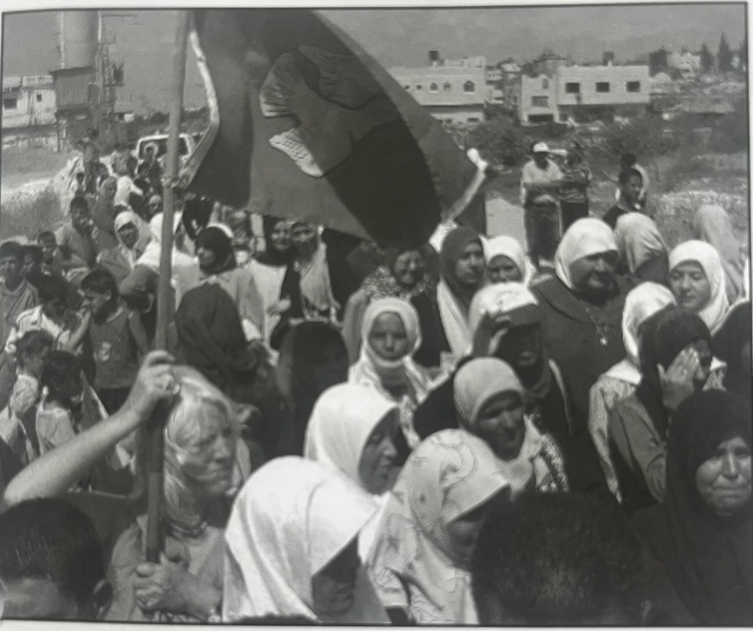 Judy and the delegation of American women joined 200 Palestinian women and 250 Israeli women on September 6, 2003, in Talkarem, West Bank, to protest the Apartheid Wall that separated the villagers from 7000 acres of their agricultural land and 26 wells. The Israeli women brought school supplies to the gate as a gift to the Palestinians. The IDF teargassed those of us on the Palestinian side of the wall. Photographer unknown.
Judy and the delegation of American women joined 200 Palestinian women and 250 Israeli women on September 6, 2003, in Talkarem, West Bank, to protest the Apartheid Wall that separated the villagers from 7000 acres of their agricultural land and 26 wells. The Israeli women brought school supplies to the gate as a gift to the Palestinians. The IDF teargassed those of us on the Palestinian side of the wall. Photographer unknown.